|
|
|
Sort Order |
|
|
|
Items / Page
|
|
|
|
|
|
|
| Srl | Item |
| 1 |
ID:
078559


|
|
|
|
|
| Publication |
2007.
|
| Summary/Abstract |
ABSTRACT. This article seeks to bring to the fore the intrinsic link between constitutional democracy and the civic nation, relying on Jürgen Habermas's theory of democracy. This theoretical framework will serve as the basis for a communicative understanding of civic nationalism, underscoring the notable role played by language. Attention will be given to the normative dimension that allows for the legitimisation of national divisions of a civic space bound by universal rights. The prime motivation behind this article is thus political-philosophical, although empirical examples, drawn particularly from the French revolutionary discourse, will be brought to bear. And since a civic nation construed in communicative terms has necessary linguistic implications, cases of multilingual and multinational states will be examined
|
|
|
|
|
|
|
|
|
|
|
|
|
|
|
|
| 2 |
ID:
082683


|
|
|
|
|
| Publication |
2008.
|
| Summary/Abstract |
Whilst there has been a proliferation of research on the role of nationalism in the exclusion of asylum seekers, less attention has been paid to how nationalism can be mobilised in accounts opposing, rather than supporting, harsh anti-asylum seeker regimes. This paper compares the ways in which 'Australia' is constructed and used in parliamentary speeches on asylum seekers by both refugee advocates and those seeking harsher asylum seeker laws in Australia. This dual focus is particularly important as it highlights the flexibility of nationalist discourse, in that the same constructions of the nation may be used for both exclusive and inclusive purposes. Whilst typologies of inclusive and exclusive nationalisms, such as Smith's (1991) ethnic/civic typology, focus on the content of nationalist ideologies, we argue that the inclusivity or exclusivity of nationalism can best be determined by examining the subject positions, political solutions and social realities they make possible, and who these discourses benefit and oppress.
|
|
|
|
|
|
|
|
|
|
|
|
|
|
|
|
| 3 |
ID:
139370
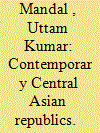

|
|
|
|
|
| Summary/Abstract |
Therefore, national policy in Central Asian States should shift from ethnocentrism to civic nationalism based on a common set of values and shared homeland. Instead of putting emphasis on historical roots, which are not only a source of pride for achievements in the past, but also a source of traumas and inter-ethnic conflicts, a focus on the contemporary achievements of the nations would be more beneficial.
|
|
|
|
|
|
|
|
|
|
|
|
|
|
|
|
| 4 |
ID:
184321


|
|
|
|
|
| Summary/Abstract |
Much of Northern Ireland remains divided as it continues to transition from a prolonged ethno-national struggle during a period of violence known as “the Troubles” (1969–1998). This conflict resulted in the loss of thousands of lives, residential segregation and the construction of “peace walls” that separate the two ethno-national communities (i.e. “Catholic”/republican and “Protestant”/loyalist) in parts of many of its cities and towns. Residential segregation and violent national projects in cities such as Belfast not only reflect wider regional national tensions; they often are the foundation from which the ethno-national conflicts first emerged and continue to persist and reinforce the non-inclusionary fissures between two communities. Exclusionary national ideologies, narratives and practices, manifested through parading, sectarian political murals and residential segregation demonstrate how many embody a restrictive vision of national identity. However, there are a few notable exceptions to these discriminatory practices – one of which is the subject of this paper. 174 Trust is a community centre in the divided northwest side of Belfast that is designed and dedicated to providing an inclusive, safe and “shared” place to foster a new form of civic nationalism. Through an analysis of their contemporary efforts to transform exclusionary historical expressions of nationalism by fostering a shared civic nationalism, this paper interrogates nationalism by focusing on a significant grassroots effort that may be overlooked in general investigations. As I suggest, the lessons offered by this community centre exemplify the potential of a micro-political approach and serve as a powerful model for future development within this and other divided communities.
|
|
|
|
|
|
|
|
|
|
|
|
|
|
|
|
| 5 |
ID:
111489


|
|
|
|
|
| Publication |
2012.
|
| Summary/Abstract |
This article brings the thought of Giuseppe Mazzini back into the field of nationalism studies, from which it has been largely missing for a half century. It suggests the following: that Mazzini is much more modern and secular than he is usually portrayed; and that his commitment to liberal policies while rejecting liberal principles suggests that the distinction between civic and ethnic nationalism has been misconceived. Nationalism, to Mazzini, was not an end in itself but a means to an end - government of, by and for the people. The demand for such a government was manifested in three popular demands in nineteenth-century Europe: in the West as democracy, in the East as national sovereignty (the precondition for democracy) and in both East and West as social democracy. Thus nationalism may be instrumental rather than an end in itself, and it may be attributable not to ethnic groups' natural striving for autonomy but to the pursuit of democracy.
|
|
|
|
|
|
|
|
|
|
|
|
|
|
|
|
| 6 |
ID:
115231
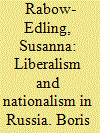

|
|
|
|
|
| Publication |
2012.
|
| Summary/Abstract |
This article investigates the link between nationalism and liberalism in Russia by looking at the way the leading spokesman of early Russian liberalism, Boris Chicherin, combined liberal ideas with notions of nation-building and the idea of the nation as a modernising phenomenon. The article argues that the young Chicherin, at least in the formative years of the 1850s, had an instrumental approach to liberalism. Liberalism served a specific purpose - to integrate the people and shape a community of active citizens so that Russia could modernise. Chicherin was concerned with the formation of a modern nation-state rather than the establishment of popular rule or political rights. In this sense, his thinking fits well into what, in the context of the Ottoman Empire, has been called modernist nationalism.
|
|
|
|
|
|
|
|
|
|
|
|
|
|
|
|
| 7 |
ID:
123765
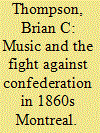

|
|
|
|
|
| Publication |
2013.
|
| Summary/Abstract |
In this article, I examine how music was used as an expression of French-Canadian identity in nineteenth-century Montréal. Focusing on the 1860s and a group of musicians and intellectuals opposed to Confederation, I explore their efforts to use performance, criticism, and composition in the (re)construction of French-Canadian identity. My main sources of information are la Presse and l'Union nationale, two newspapers of the time that were strongly opposed to Confederation and which were vigorous in the promotion of musical events. Through an examination of the musical and political activities advertised and reviewed in the pages of these and other newspapers, we shall see how culture was used as a means to strengthen French-Canadian nationalism. At the same time, while the musicians themselves may have sought an independent Québec, they remained open to other cultures and through their collaboration with non-francophones articulated a form of civic nationalism.
|
|
|
|
|
|
|
|
|
|
|
|
|
|
|
|
| 8 |
ID:
119466
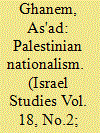

|
|
|
|
|
| Publication |
2013.
|
| Summary/Abstract |
A ccording to the literature there are two types of nationalism: First, Civic (territorial) nationalism emphasizes the common territory and citizenship as the criteria for individualsâ?? inclusion in the national group. 1 Here the national group is the totality of citizens, with no emphasis on their primordial ethnic affiliation; the national culture consists chiefly of civic and universal values. This kind of nationalism is found in France, Great Britain, and the United States. Civic nationalism crystallizes under the shadow of attempts to establish hegemony for the dominant group culture, values and basic beliefs.
|
|
|
|
|
|
|
|
|
|
|
|
|
|
|
|
| 9 |
ID:
120372
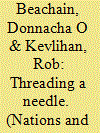

|
|
|
|
|
| Publication |
2013.
|
| Summary/Abstract |
This paper examines the state-building project in Kazakhstan since independence in 1991. It argues that both civic and ethno-nationalistic tendencies in state-building can be identified but that it is not any particular trajectory of nationalism in Kazakhstan that is of significance so much as the tensions between two very different trajectories. We argue that, at least to date, the government has succeeded in managing these tensions quite effectively both at the policy level and in its relations with different ethnic groups and neighbouring states. Whether Kazakhstan can continue to manage these tensions in the post-Nazarbayev era is one of the most significant questions facing the country.
|
|
|
|
|
|
|
|
|
|
|
|
|
|
|
|
| 10 |
ID:
086959
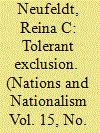

|
|
|
|
|
| Publication |
2009.
|
| Summary/Abstract |
During war, the demarcation 'enemy alien'- whether on ethnic or civic grounds - can lead to loss of political, social or economic rights. Yet not all minorities are excluded even though they pose problems for civic and ethnic national categories of belonging. This article explores the experiences of an ethno-religious minority who posed an intriguing dilemma for ethnic and civic categorisation in North America during World War II. The Mennonite experience enables a close examination of the relationship between a minority ethnic (and religious) group and majority concepts of wartime civic and ethnic nationalism. The article supports arguments that both ethnic and civic nationalism produce markers for the exclusion of minority groups during wartime. It reveals that minority groups can unintentionally become part of majority 'nationalisms' as the content of what defines the national ideal shifts over time. The experiences also suggest that a minority group can help mobilise symbolic resources that participate in transforming what defines the national ideal.
|
|
|
|
|
|
|
|
|
|
|
|
|
|
|
|
| 11 |
ID:
161050


|
|
|
|
|
| Summary/Abstract |
This paper presents a comparative analysis of Belarus and Ukraine with a focus on the evolution of national self-identity in both countries. It is assumed that their detachment from Russia is an inherent part of this process due to Russia’s long-term and overwhelming influence on all aspects of life in the national communities of both countries, including high and popular culture. The author points out that the forms and consequences of this detachment are not predetermined and depend on the structural peculiarities of the areas of Russian influence and on political decisions. The prevailing type of nationalism in both countries also impacts this process. Ethnic nationalism, which is widespread in Central and Eastern Europe, is more explosive and painful than civic nationalism. This analysis is not formalized and is based on field observations. The author admits that having written two monographs (Ioffe, 2008; Ioffe, 2014) and numerous articles on Belarus, he is more knowledgeable about Belarus than Ukraine.
|
|
|
|
|
|
|
|
|
|
|
|
|
|
|
|
|
|
|
|
|